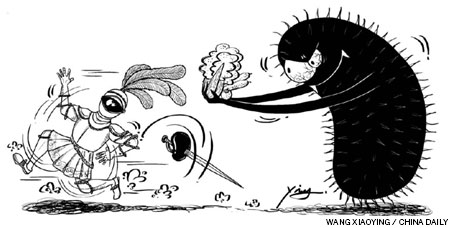
The outbreak of disease caused by a new strain of E. coli once again shows the increasing vulnerability of human beings to bacteria and viruses, which are getting deadlier and more resistant to antibiotics.
|
||||
The outbreak of a deadly disease caused by a new strain of the E. coli bacteria is the latest chapter of the victory of new forms of bacteria and viruses over medicines and thus over human beings. The new strain of the already rare 0104 type of E. coli is different from other common types of E. coli which normally cause only a mild ailment. The World Health Organization (WHO) said the variant had "never been seen in an outbreak situation before".
The center of the outbreak is Hamburg in northern Germany and almost all the deaths have occurred in Germany. Those affected were either in Germany or people in 20 countries who had visited Germany. The place of origin of the disease is still a mystery, as is the specific food that it spread through. Warnings had been issued, though, against eating raw cucumber, tomato and lettuce, which are salad vegetables.
"Normal" E. coli usually produces mild sickness in the stomach, but the new strain of E. coli 0104 causes bloody diarrhea and severe stomach cramps. In more than 500 of the more serious cases, it has also caused haemolytic-uraemic syndrome (HUS), which damages blood cells and the kidneys.
A major problem is that the bacterium is resistant to antibiotics. The treatment recommended under intensive care has been plasma exchange, kidney dialysis and blood transfusions. The New York Times quoted Stephen Smith, a lecturer in clinical microbiology at Trinity College in Dublin, Ireland, as having said that eradication of such types of bacteria is impractical partly because they are able to evolve rapidly.
"These microbes are always exchanging information and there's always new ones appearing," Smith said. "What we've got now is a fusion of two different types that's taken the worst elements of each." Prevention is probably the best approach.
Smith's view depicts a serious situation. E. coli is only one example. There are several dangerous microbes that are difficult to fight because they continuously evolve or mutate and become resistant to more and more powerful antibiotics. One way in which they evolve is when separate genes from various strains of the bacteria, or even of different types of bacteria, come together in a kind of hybrid.